clinical psychology - Health Sciences - Curtin University
clinical psychology - Health Sciences - Curtin University
clinical psychology - Health Sciences - Curtin University
Create successful ePaper yourself
Turn your PDF publications into a flip-book with our unique Google optimized e-Paper software.
2CONTENTSAbout the Master and PhD in Clinical Psychology................2Graduate Destinations.........................................................3Management of Progress through the Programs.............3Liaison with the Professional Community........................3Assessment............................................................................3Recognition of Prior Learning..............................................3Policy on Plagiarism and Related Academic Conduct.....3Course Expenses....................................................................3Master of Psychology (Clinical) Program...............................4Course Objectives..................................................................4Core capabilities and attributes..........................................4Program Structure................................................................4Course Entry Requirements/Prerequisites........................4Duration and Availability.....................................................4Master of Psychology Course Structure............................5Doctor of Philosophy (Clinical Psychology)...........................6Course Objectives..................................................................6Overarching Outcomes.........................................................6Specific Learning Outcomes................................................7Program Structure................................................................7Course Entry Requirements/Prerequisites........................7Duration and Availability.....................................................7Doctor of Philosophy Course Structure..............................8Unit Descriptions........................................................................9Program Staff and Research Interests..................................10ABOUT THE MASTERAND PHD IN CLINICALPSYCHOLOGYClinical <strong>psychology</strong> is one of a number of specialisationsin professional <strong>psychology</strong>. Similar to psychologists whopractice in other specialist areas such as organisational<strong>psychology</strong>, counselling <strong>psychology</strong> and forensic<strong>psychology</strong>, Clinical psychologists hold a Masters orPhD degree from a program accredited by the AustralianPsychology Accreditation Council. At <strong>Curtin</strong> <strong>University</strong>,Clinical <strong>psychology</strong> is offered as a specific major streamwithin the Master of Psychology program and as a full PhDprogram. Graduates will be eligible to register with thePsychology Board of Australia and commence supervisionfor the purpose of gaining registration and endorsement asa Clinical Psychologist.The Master of Psychology (Clinical) provides advancedprofessional training to the sixth year level. The programis accredited with the Australian Psychology AccreditationCouncil. The course is a two-year full-time program(or equivalent part-time) consisting of course work,practicum and a dissertation. Graduates of the programwill be entitled to endorsed registration as a ClinicalPsychologist with the Psychology Board of Australia,once they complete two years of supervision as a ClinicalPsychologist registrar.The PhD (Clinical Psychology) consists of the units inthe Master’s program plus a traditional PhD dissertation.The program meets all of the criteria listed above forAPAC and the Psychology Board of Australia. The PhD isa four-year full-time (or eight-year part-time) program. Anormal PhD is three years full-time and the Master is twoyears full-time, so the PhD (Clinical Psychology) reducesthe amount of time involved in study, for those pursuing acombined program. Another advantage of the PhD (ClinicalPsychology) is that all program fees for domestic studentsare covered through automatic university scholarships,meaning that students pay no fees for all of their masterunits. The PhD prepares graduates for the professionalpractice of Clinical Psychology, for research in <strong>psychology</strong>,and for an academic career.Graduate DestinationsGraduates of the Clinical Psychology course are very highlyregarded and highly successful at competing for jobs. Theareas that graduate typically works in on graduation are:• Government agencies – Child and Adult Mental <strong>Health</strong>Services, private agencies and hospitals e.g.,Perth Clinic;• Child Development Centres;• Department for Child Protection;• Disability Services Commission private practice;• <strong>University</strong> counselling services;• <strong>University</strong> teaching departments.Management of Progress through the ProgramsEach student is supervised in her/his studies by acommittee composed of the <strong>clinical</strong> <strong>psychology</strong> coursefaculty. This committee may meet with the student fromtime-to-time and will monitor her/his progress throughall facets of the program. The doctoral component will bemonitored through the School Postgraduate Committee.Liaison with the Professional CommunityA Course Advisory Committee meets regularly to confer onmatters related to the <strong>clinical</strong> program. It assists annuallyin the selection of students for the following year’s intake.The committee consists of <strong>Curtin</strong> Clinical Faculty, studentrepresentatives and senior Clinical Psychologists frommajor government authorities. During 2012, these seniorclinicians include:Ms Annette PaulClinical PsychologistDepartment for Child ProtectionMs Jessica AderlySenior Clinical PsychologistDisability Services CommissionMs Margaret JonesConsultant Clinical PsychologistChild and Adolescent Mental <strong>Health</strong>,<strong>Health</strong> Department of WAMr John PereraSenior Clinical PsychologistDepartment for Child ProtectionMs Teresa StevensonSenior Clinical PsychologistAdult Services, <strong>Health</strong> Department of WARecognition of Prior LearningComparable units taken at APS accredited PsychologyMasters programs may be exempted. Units taken overseasmay also be exempted but will be evaluated on acase-by-case basis.Policy on Plagiarism and Related Academic ConductAll work submitted must be the original work of studentsunless otherwise specified. All work must conform to<strong>Curtin</strong> <strong>University</strong> policies on Academic Conduct (seeAcademic Misconduct Procedure and Plagiarism Policyand Procedures at the web address below or the <strong>Curtin</strong>Courses Handbook.) http://policies.curtin.edu.au/policies/students.cfmCourse ExpensesFor detail information about course expenses, please referto http://fees.curtin.edu.au/3AssessmentAssessment includes a combination of class participation,written reports, case studies, substantive papers,and formal examinations. Students must also satisfyattendance requirements for each unit. All writtenassignments must be submitted in accordance withPublication Manual of the American PsychologicalAssociation: Sixth Edition (2009) (http://www.apastyle.org/). To complete the requirements for award of thedegree, students must pass all units in the program.
4MASTER OFPSYCHOLOGY(CLINICAL) PROGRAMCourse ObjectivesThe Master degree in <strong>clinical</strong> <strong>psychology</strong> providesadvanced professional training to the sixth year leveland has been accredited by the Australian PsychologyAccreditation Council (APAC). Its aim is to enable studentsto become thoroughly familiar with the theoretical andempirical knowledge base, skills and attributes requiredof a Clinical Psychologist in community and institutionalhealth, mental health and rehabilitation settings. Thiscourse provides sound training in the application ofpsychological science to the prevention and treatment ofpsychological problems.This major will provide you with the knowledge, skills andexperience you need to practise as a Clinical Psychologistin both the mental and physical health domains. You willbe trained in the application of psychological science to theprevention, treatment and rehabilitation of physical andmental health problems. Much of your studies will focus oncommunity-based interventions.Core capabilities and attributes:A graduate of the Master of Psychology (Clinical) has:1. Overall knowledge of the discipline underpins all ofthe other capabilities and includes knowledge ofpsychological principles, professional ethics andstandards, theories of individual and systemicfunctioning and change, dysfunctional behaviour,psychopathology, the cultural bases of behaviourand organisational systems.2. The ethical, legal and professional aspects ofpsychological practice.3. The ongoing, interactive, and inclusive processthat serves to describe, conceptualise, and predictrelevant aspects of a client.4. Activities that promote, restore, sustain or enhancecognitive functioning and a sense of well-being inindividuals or groups of clients through preventive,developmental or remedial services and/or inthe case of groups or organizations, restoring orenhancing group or organizational functioning.5. Systematic inquiry involving problem identificationand the acquisition, organisation, and interpretationof information allowing critical analysis anddisciplined, rigorous, careful and scientific inquiryinto psychological phenomena.6. The capacity to convey, appraise and interpretinformation in both oral and written formats and tointeract on a professional level with a wide range ofclient groups and other professionals.Program StructureThe program consists of three main components:coursework, practicum placements, and a researchdissertation. The coursework provides intensive trainingin <strong>clinical</strong> <strong>psychology</strong>. Coursework seminars focus on theunderstanding and management of significant mental andphysical health problems with approaches ranging fromindividual-oriented to community-based. While the mainfocus of training is on individual treatment approaches,there is also a focus on larger scale interventions,particularly those involving primary prevention methods.The coursework seminars involve an integration of theory,specific intervention skills training, and the development ofanalytical skills.Students also participate in three practicum placements,which complement the coursework and enable theapplication of theory and skills training to <strong>clinical</strong> practice.These placements cover adult and child problems,institutional and non-institutional settings, acute careand rehabilitation with the disabled, in both medical andnon-medical agencies. Practicum placements include atotal of 135 days or 1,020 hours of supervised practiseconducted by a registered Clinical Psychologist.A major aim of the research component is to acquaintstudents with research and evidence-based practice in<strong>clinical</strong> and health <strong>psychology</strong> and for them to developthe capacity to review research reports critically, andto develop and conduct their own research project.Coursework material and assignments will encouragestudents to think critically and to evaluate theories,research, and case reports. The training will providea framework and basis for a publishable researchdissertation to be completed by each student in an area of<strong>clinical</strong> <strong>psychology</strong>.Course Entry Requirements/PrerequisitesA four-year Bachelor of Psychology or equivalent, approvedby the Australian Psychological Society (APS) is requiredfor admission.Duration and AvailabilityThe course is two years full-time or equivalent part-timestudy.COURSESTRUCTUREMaster of Psychology307074 Clinical Psychology MajorYearUnitsRequiredUnit NameContactHoursYear 1, Semester 1 309511 Psychology 793 - Clinical Child 3 25309513 Psychology 795 - Preparation for Professional Clinical Practice 4 25309516 Psychology 711 - Psychological Assessment 3 25309517 Psychology 722 - Adult Psychopathology 3 25Year 1, Semester 2 309518 Psychology 724 - Child Psychotherapy and Disability 3 25OR309520 Psychology 702 - Psychotherapy 3 25309519 Psychology 703 - Research Methods 3 256726 Psychology Practicum 696 16 25309522 Psychology 723 - Social and Behavioural <strong>Health</strong> 4 25Year 2, Semester 1 309521 Psychology 725 - Addictions and Clinical Neuro<strong>psychology</strong> 4 256727 Psychology Practicum 697 15 256729 Psychology Dissertation Preparation 1 699 1 50Year 2, Semester 2 309520 Psychology 702 - Psychotherapy 3 25OR309518 Psychology 724 - Child Psychotherapy and Disabilities 3 256728 Psychology Practicum 698 15 256730 Psychology Dissertation Preparation 2 699 1 50CreditPoints5
6DOCTOR OFPHILOSOPHY(CLINICALPSYCHOLOGY)Course ObjectivesThe Doctor of Philosophy (Clinical Psychology) coursecombines advanced professional training in <strong>clinical</strong><strong>psychology</strong> with the opportunity to carry out a specialisedresearch program at the traditional PhD level. This courseprepares students for careers in the professional practiceof <strong>clinical</strong> <strong>psychology</strong>, for research in <strong>clinical</strong> <strong>psychology</strong>,and for an academic career. The coursework componentof the course provides professional training to the ‘sixthyear level’ and has been accredited by the AustralianPsychology Accreditation Council (APAC). This courseaims to enable students to become thoroughly familiarwith the theoretical and empirical knowledge base andskills required of a <strong>clinical</strong> psychologist in communityand institutional health, mental health and rehabilitationsettings, as well preparation for a research career.Overarching OutcomesA graduate of the Doctor of Philosophy (ClinicalPsychology) has:1. Knowledge, skills and practical experience necessaryfor competent practice as a <strong>clinical</strong> psychologistin both the mental health and physical healthdomains.2. A competent entry level scientist-practitioner of<strong>clinical</strong> <strong>psychology</strong>.3. Abide by the code of ethics of the AustralianPsychological Society.4. An effective beginning level independent researcherin <strong>psychology</strong>.Specific Learning Outcomes1. Construct an adequate psychological caseconceptualization.2. Think critically, creatively and reflectively.3. Test hypotheses related to the caseconceptualisation and develop management plans.4. Think creatively and apply knowledge to newsituations.5. Analyse problems logically from different theoreticalviewpoints and propose resolution betweenapparent conflicts of different theories.6. Communicate effectively with individuals andgroups.7. Write effectively for clients, professionals,management and scientific publications.8. Use evidence persuasively to construct and defendan argument.9. Learn and use technologies safely and appropriatelyfor the diagnosis and management of clients andinformation.10. Accept responsibility and demonstrate initiative andleadership in developing <strong>clinical</strong> and research skills.11. Apply global perspectives and standards in <strong>clinical</strong>practice.12. Apply global perspectives and standards of practicein meeting the needs of ethnic and other minoritygroups.13. Work professionally both individually andcollaboratively, accepting responsibility anddirection as necessary to achieve an effective teamoutcome.14. Abide by the code of ethics of the AustralianPsychological Society.Program StructureThe program consists of three main components:coursework, practicum placements and a researchthesis. The coursework provides intensive training in<strong>clinical</strong> <strong>psychology</strong>. Coursework seminars focus on theunderstanding and management of significant physicalhealth and mental health problems with approachesranging from individual-oriented to community-based.While the main focus of training is on individual andgroup treatment approaches, there is also a focus onfamily interventions and interventions involving primaryprevention methods. The coursework seminars involve anintegration of theory, specific intervention skills trainingand the development of analytical skills.The coursework acquaints students with research in<strong>clinical</strong> and health <strong>psychology</strong>, <strong>clinical</strong> guidelines fortreatment and prevention of mental health problems, andempirically based interventions for children and adults.Students develop the capacity to review research critically,and to develop and conduct their own research project.Coursework material and assignments will encouragestudents to think critically and to evaluate theories andresearch reports.The research component involves the developmentand execution of a substantial program of researchthat contributes substantially to the knowledge orunderstanding in a field. This work indicates that thestudent is capable of carrying out independent research.For the PhD in Clinical Psychology the project must havesome relevance to <strong>clinical</strong> <strong>psychology</strong>. Doctoral researchdegree candidates should uncover new knowledge eitherby the discovery of new facts, the formulation of theoriesor the innovative re-interpretation of known data andestablished ideas.The thesis research should include a program of inquiry,which is practically oriented and useful in developing aneffective understanding, providing for the application ofsolutions to problems associated with <strong>clinical</strong> <strong>psychology</strong>.Course Entry Requirements/PrerequisitesThe minimum requirement for admission to the Doctor ofPhilosophy (Clinical Psychology) program is an Honoursdegree (IIA or higher) or equivalent. Applicants will beevaluated on academic merit, referees’ reports, proposedcourse of research, performance in interviews, and relevantwork experience. For students already/previously enrolledin the Master of Psychology (Clinical) course or equivalent,a high standard of performance in Master of Psychologyunits will also be required for entry into the programDuration and AvailabilityThe course is available on a full-time (minimum of fouryears) and on a part-time (maximum of eight years) basis.Students are expected to spend eleven months per year onthe program for the duration of the course.7Students also participate in three practicum placements,which complement the coursework and enable theapplication of theory and skills training to <strong>clinical</strong> practice.These placements cover adult and child problems,institutional and non-institutional settings, acute careand rehabilitation with the disabled, in both medical andnon-medical agencies. Practicum placements includea total of 135 days or 1,020 hours of supervision by apractising Clinical Psychologist.
8PROGRAMSTRUCTUREDoctor of Philosophy314234 Clinical PsychologyYearUnitsRequiredUnit NameContactHoursYear 1, Semester 1 99173 Doctoral Thesis - Psychology 575309511 Psychology 793 - Clinical Child 3 25OR 25309517 Psychology 722 - Adult Psychopathology 3 25309513 Psychology 795 - Preparation for Professional Clinical Practice 3 25Year 1, Semester 2 99173 Doctoral Thesis - Psychology 575309519 Psychology 703 - Research Methods 3 25309522 Psychology 723 - Social and Behavioural <strong>Health</strong> 4 25Year 2, Semester 1 99173 Doctoral Thesis - Psychology 575309516 Psychology 711 - Psychological Assessment 3 25309526 Psychology 796 - Practicum (Clinical) (Related to the child/adult Unit completed in Year 1 - Semester 1)15 25Year 2, Semester 2 99173 Doctoral Thesis - Psychology 575309520 Psychology 702 - Psychotherapy 3 25OR309518 Psychology 724 - Child Psychotherapy and Disability (Relatedto the practicum placement completed in Year 2 - Semester 1)3 25309527 Psychology 797 - Practicum (Clinical) Disability/Rehab 15 25Year 3, Semester 1 99173 Doctoral Thesis - Psychology 575309528 Psychology Practicum 798 (Clinical) 15 25309511 Psychology 793 - Clinical Child 3 25OR309517 Psychology 722 - Adult Psychopathology 3 25Year 3, Semester 2 99173 Doctoral Thesis - Psychology 575309520 Psychology 702 - Psychotherapy 3 25OR309518 Psychology 724 - Child Psychotherapy and Disability(Unit related to practicum completed in Year 3 - Semester 1)3 25309528 Psychology 798 - Practicum (Clinical) 15 25Year 4, Semester 1 99173 Doctoral Thesis - Psychology 575309521 Psychology 725 - Addictions and Clinical Neuro<strong>psychology</strong> 4 25Year 4, Semester 2 99173 Doctoral Thesis - Psychology 575CreditPointsUNITDESCRIPTIONSPsychology 793 – Clinical ChildThis unit provides theoretical knowledge and practicalexperience in <strong>clinical</strong> child <strong>psychology</strong>. The unit exploresthe etiology, assessment, diagnosis, conceptualization,and treatment of <strong>clinical</strong> problems of children andadolescents. These problems will be considered within therelevant social context, such as the family, the school, andchildren’s friendships. The unit covers the most commonchild <strong>clinical</strong> problems as well as best practice guidelinesand empirically validated interventions.Psychology 795 – Preparation for Professional ClinicalPracticeIn this unit there is a strong emphasis on role plays andpracticing case examples to allow experiential learning toassist in integrating the information from readings andinformation that is presented and discussed in seminars.Individual perceptions and reflections are encouraged tobe shared with the group to facilitate learning and greaterunderstanding of issues. There is also an emphasis on ethicaland legal issues in practice as a <strong>clinical</strong> psychologist so arange of ethical issues will be posed through case studiesand role play. There is also an emphasis on self-care whichcan sometimes be forgotten when dealing with client issues.Psychology 711 – Psychological AssessmentThis unit provides students with the practical skills tocomplete comprehensive psychological assessmentswithin adult and child <strong>clinical</strong> contexts. Students willlearning skills required to select, administer, score andinterpret the results of commonly used psychologicaltests, and to integrate assessment results and presentfindings in client-focused reports.Psychology 722 – Adult PsychopathologyThis unit aims to increase students’ understanding ofcommon psychological disorders, including their aetiology,maintaining mechanisms, and effective treatment.Psychology 724 – Child Psychotherapy andDevelopmental DisabilityThe first part of the unit provides students with anunderstanding of the physiological, behavioural and socialconsequences associated with developmental disabilities,and strategies to assess, intervene and support the qualityof life of individuals with a disability and their families.This second part of this unit provides students with childand adolescent psychotherapy skills and processes. Itincludes; (i) core principles of child, adolescent and familypsychotherapy processes; (ii) skills development in theapplication of psychotherapy processes; and (iii) review ofstudent videotaped psychotherapy sessions.Psychology 702 - PsychotherapyThe first part of the unit involves 7 seminars in child andadolescent psychotherapy. It includes: (a) a theoreticalcomponent in which core principles of child, adolescentand family psychotherapy processes are explored; (b) askills development component in which the applicationof psychotherapy processes are modelled and practiced;and (c) a supervision component in which videotapesof participants’ psychotherapy sessions are reviewed.The second part of this unit provides students with anunderstanding of the physiological, behavioural and socialconsequences associated with developmental disabilities.The seminars emphasis assessment, interventionstrategies, and service philosophies aimed at individuals,environmental, and systems change to improve the qualityof life of individuals with a disability and their families.Psychology 703 – Research MethodsThe focus of this online unit is on quantitative, rather thanqualitative, research methodologies. It consists of eightcore modules, and three elective modules. You are expectedto complete all the core modules plus two of the threeelective modules. On completion of the unit, you shouldbe able to resolve the common methodological problemsthat have traditionally compromised research in thebehavioural sciences.Psychology 723 – Social and Behavioural <strong>Health</strong>The content of this unit has been designed to foster anunderstanding of both <strong>clinical</strong> health problems and healthpromotion in health <strong>psychology</strong>. There will be a strongemphasis on conceptualisation of <strong>clinical</strong> health problemsas well as evidence based interventions. The unit startswith an overview of health <strong>psychology</strong> and the first set ofseminars cover the <strong>clinical</strong> health problems of postnataldepression and sexual dysfunction where re-occurringissues concerning relationship problems are addressed andan introduction to couple therapy is provided. Additional<strong>clinical</strong> problems covered include pain and obesity. Finally,health promotion and prevention issues, as well as crossculturaland indigenous issues in health <strong>psychology</strong> willbe presented. The content is structured so that theoreticalperspectives of health <strong>psychology</strong> are integrated withpractical applications of interventions.Psychology 725 – Addictions andClinical Neuro<strong>psychology</strong>You will be provided with an understanding of addictionbehaviour and how to respond to it from a psychologicalperspective. The addiction seminars will focus on etiology,assessment, case conceptualization and a range ofresponses to people with addiction problems. There willbe particular emphasis on responding to clients withaddiction and other psychological difficulties.Psychology – Research Dissertation (1 699 and 2 699)These two units involve the planning, execution andreporting of a suitable applied research project, relating tothe coursework undertaken.Psychology Practicum 696, 697 and 698You are assigned to an agency to carry out negotiatedprofessional duties (usually 2 days/week). You are alsorequired to attend a fortnightly placement class involvingcase presentations and written case formulations. Overthe three placements a combined total of 133 days shouldbe completed.9



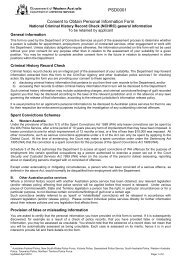
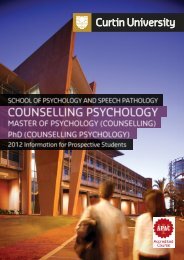
![Mental health commission report July 2010 - June 2011 [.pdf]](https://img.yumpu.com/50755705/1/184x260/mental-health-commission-report-july-2010-june-2011-pdf.jpg?quality=85)
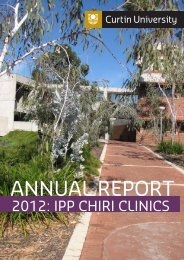
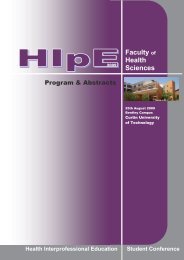
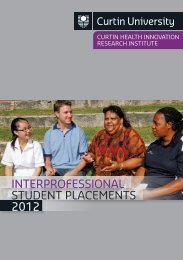
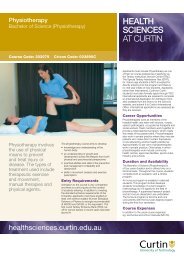
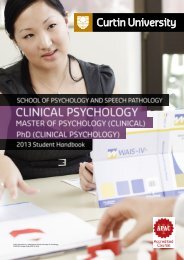

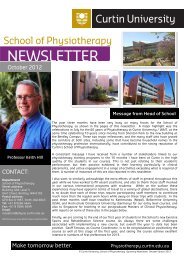

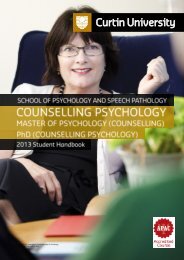
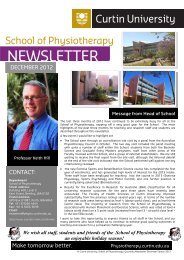
![2007 Annual Report [.pdf] - Health Sciences - Curtin University](https://img.yumpu.com/44476724/1/184x260/2007-annual-report-pdf-health-sciences-curtin-university.jpg?quality=85)